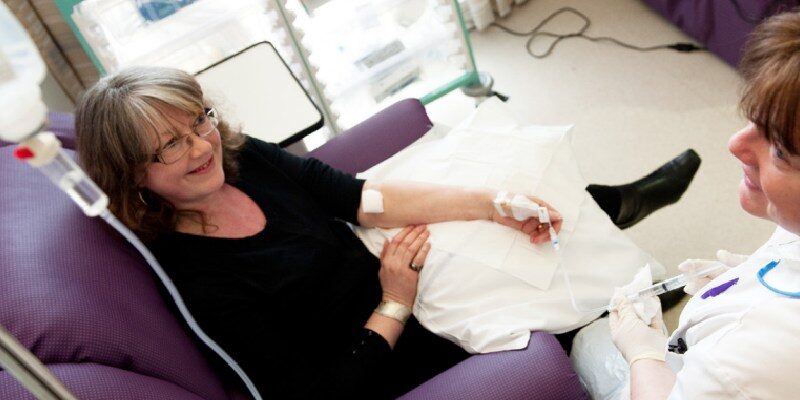
Leeds Cancer Centre treats over 5,000 patients per year.
Due to continuous research many treatments have been developed to treat cancer alongside chemotherapy. These include immunotherapies, targeted therapies and hormone treatments. These can be given via injections, infusions or as oral medication. The drugs circulate around all the body to slow or stop the growth of cancer.
The collective name for all the treatments given, including chemotherapy, is Systemic Anti-Cancer Therapy (SACT). You may have a number of different drugs or treatments that work together to treat the cancer. The type of treatment you receive will depend on the type of cancer you have and many other factors which will be discussed at your consultation with your doctor.
We deliver these treatments across a number of different areas, including:
On this page
What is Chemotherapy?
Chemotherapy (“chemo”) is a treatment with drugs which destroy or control the growth of cancer cells. These maybe given as tablets, by injection or as an infusion (sometimes called a drip) into a vein. There are many different types of chemotherapy drugs, which can be used in combination with each other. This is because different drugs destroy the cancer cells in different ways. Because chemotherapy can affect normal cells in the body as well, this sometimes causes unpleasant side effects. However, normal cells will usually re-grow and heal quickly, so the damage to the normal cell is only temporary.
Specific information about the potential side effects of chemotherapy treatment is given to each patient along with clear advice of what to do if they occur. All patients are given a phone number to contact a skilled health professional 24-hours a day to discuss any issues such as side effects, or if feeling unwell whilst chemotherapy is being received.
You can also watch an information video about Chemotherapy at Leeds Cancer Centre.
What is Immunotherapy?
Immunotherapy is treatment that targets the immune system to help it find and attack cancer cells. The main type of immunotherapy that we give patients are called checkpoint inhibitors. Some cancer cells are able to send out signals that help them to hide from the immune system and means they can grow and develop. Checkpoint inhibitors are able to block those signals. This means that the immune system remains active to fight the cancer cells. The side effects of immunotherapy are different to those from chemotherapy. It can cause the immune system to go into overdrive and attack the body’s healthy cells. Patients on immunotherapy are closely monitored for these side effects and they can usually be managed with prompt treatment. It is important if you are on immunotherapy and develop any side effects that you contact the hospital for advice.
Please refer to the Patient Information Leaflet: Coming for Immunotherapy for further information.
What is targeted therapy?
Targeted therapies are drugs that specifically target a chemical signal or protein receptor inside or outside a cancer cell to prevent it growing and dividing. The aim is to have more personalised treatment that is specific to individuals. There are lots of different types. If there is a targeted treatment available for your cancer type you will have specific tests to see if you have the ‘target’ in your cancer cells. If you don’t have the target these drugs will not work for you. Some are given as oral tablets, some as injections and some as intravenous infusions. Immunotherapy is one type of targeted treatment.
What is hormone therapy?
Hormones are natural substances made in our bodies. They are carried around the body in the bloodstream acting as messengers between one part of the body and another part. Some cancers use hormones to grow and develop. Hormone therapy for cancer uses medicines that block or lower the amount of hormones in the body which stops or slows the growth of the cancer cells. These drugs are in injection or tablet form.
All the different types of treatments are delivered by a highly committed multi-disciplinary team of medical, pharmacy and nursing staff who are highly trained professionals in their specific areas. Our teamwork makes sure that all patients have the best possible treatment and supportive care available.
For more information about the specific treatments that have been prescribed please follow this link to the Macmillan website and for additional information there is a selection of information leaflets covering cancer treatments at your disposal.
For patients receiving treatments, please see the treatment pathway page.